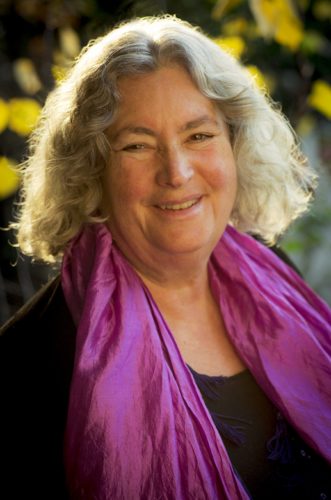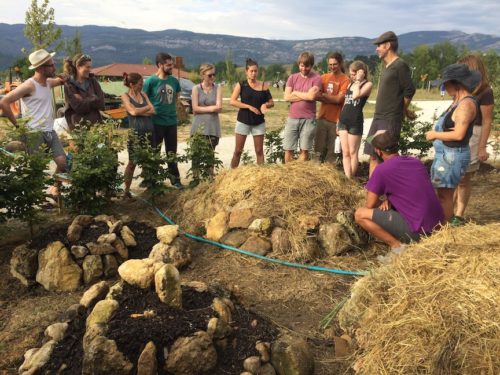[Throughout the year, The Wild Hunt follows the heart of the Pagan, Heathen and polytheist world, sharing news and discussing important issues. If you read The Wild Hunt and enjoy the service, consider donating to our Fall Fund Drive. This drive is what funds TWH for the entire year and keeps our team serving you professional news and commentary each day. It is your support now that makes it all happen the remaining 365 days! This is your community; TWH is your community news source. Donate today and share our link! Thank you.]
SAN FRANCISCO – It has been nearly a quarter of a century since Starhawk’s seminal novel The Fifth Sacred Thing was released by Bantam Books. It was 1993 when the world was first introduced to this dystopian story, set in the not-so-distant future of 2048, where our heroes must protect their northern California ecotopia from ruthless invaders. The book went on to become an inspiration for a new generation of pagans, feminists, goddess-worshippers, activists and environmental advocates.
Never going out of print, The Fifth Sacred Thing has sold over 100,000 copies, been translated into four languages and is now being developed into a television series. And, as of August this year, The Fifth Sacred Thing has been re-released for the first time in audiobook format.

Starhawk [Courtesy Photo]
Working with her production partner, Maya Lilly, Starhawk entered the studio to turn the 496 pages of the story into a recording. After the original publisher declined to take on this project, Starhawk was able to regain the rights to do the project herself. Fortunately, Lilly is a experienced voice actor, and her life partner is a sound engineer. This gave them a team capable of proceeding with the project, under their own terms.
After a month of planning, the team got to work in the studio, finding time between their many other projects. The finished audiobook is 22 hours of talking, which equals 44 hours of voice work, plus 168 hours of editing. In the end, Starhawk is very pleased with the result, and Lilly’s voicing of the story.
“I think she did a great job, getting those subtle differences in the voices, so you feel like different people are talking.”
And if Maya Lilly’s name sounds familiar to fans of the book, it can be chalked up to serendipity, said Starhawk: “She happens have the names of two characters in the book. It was a pure coincidence. Plus, she happens to look exactly like my picture of Madrone. Something is at work here!”
In addition to launching the audiobook, Starhawk also recently traveled to Spain to co-teach the Earth Activist Training permaculture course with Alfred Decker. The two-week course was held at a camp near the village of Arbizu, Navarra, in the north of Spain. This area is part of the Basque Country, famous for its association with the Spanish Inquisition and the Witch Hunts that took place there in the 17th century. More than 7,000 individual cases of witchcraft were tried during this time, and this is commemorated in the local Zurgaramurdi Witch Museum, which Starhawk visited and was astounded by.
Starhawk recalled: “The bottom floor had a powerful memorial to all the witches who were accused, and burned and tortured. It went through the history of the witch persecutions. The second floor was all about the ancient religion of the Basques, which is a religion of the Goddess. I can’t even really describe how I felt there, it was this whole history that we have been talking about, and advocating for, and arguing about, in my case – for decades.”

Permaculture students in the garden, in Arbizu, Spain [Courtesy Photo]
Almost 25 years later, The Fifth Sacred Thing almost seems prophetic, and this is not lost on Starhawk. While the streets of San Francisco have not been completely dug up to plant gardens, and we have not suffered an apocalypse, some of the books themes, both good and bad, echo in our world today.
“The whole movement toward urban gardening and food growing and urban farming is enormous. Twenty-five years ago it didn’t even really quite exist in the same way” she noted, “and we also see the forces of brutality and this upsurge in racism, in the murder of people of color by police, we see an upsurge, with Donald Trump in outright, outspoken misogyny and hatred of women and making that somehow acceptable.”
Starhawk is quick to note how our climate is changing and our environment is in danger. However, she is also sure that there is much hope, explaining that she sees many people newly embracing the practices of permaculture and how using it can effect positive change for the planet.
She said, “One of the exciting things now, is what permaculture can bring to the discussions around climate change. This isn’t just about carbon numbers. This is about ecosystem degradation on a large scale. The answer to it, is about ecosystem regeneration on a massive scale, and that is something permaculturalists know how to do. The good news is it can be done, and often doesn’t even take as long as you think it would.”
Permaculture courses will keep Starhawk on the road throughout October, with appearances in Nevada City on Oct. 14 and San Rafael on October 22 – 23. She is also preparing to lead the 37th Annual Reclaiming Spiral Dance in San Francisco on Oct. 30, celebrating Samhain.
Starhawk added that she highly recommends that anyone interested in attending the annual Reclaiming event make sure that they secure tickets in advance, as the venue has a limited capacity, and looks like it will be sold out by the actual date.
Once enough copies of The Fifth Sacred Thing audiobook have been sold to pay back the cost of production, Starhawk’s plan is to record a reading of City of Refuge, the sequel to The Fifth Sacred Thing, for an audiobook. There are no plans at present to make audiobooks for any of her non-fiction works, such as Spiral Dance.
The Fifth Sacred Thing audiobook is widely available for purchase online at Amazon, iTunes and Audible.
Donat and Support The Wild Hunt! Thank you!
The Wild Hunt is not responsible for links to external content.
To join a conversation on this post:
Visit our The Wild Hunt subreddit! Point your favorite browser to https://www.reddit.com/r/The_Wild_Hunt_News/, then click “JOIN”. Make sure to click the bell, too, to be notified of new articles posted to our subreddit.
“Starhawk went on to add, “People were saying that there never were goddesses, Marija Gimbutas was making it all up…..and then here it was, it’s still a living memory, ingrained in the Basque culture, and which I think for them, is very much a part of their sense of having a culture that is very distinctive.
There were many culture that did (and continue to have) goddesses influencing their culture. For example, Lithuania has many goddesses that inform their culture including Saule, Asrine, Laima, etc. and what about India which still has a living goddess culture as well as Nepal? However, Marija Gimbutas noted just before she died that she felt she had been too influenced by feminist belief systems when she wrote her seminal books on prehistoric cultures.
Starhawk has been wrong a number of times.
Gimbutas was a scholar and she eventually recognized the errors in her theories. It was important that she forward to admit it those errors. However, PC being what it is does not like when people prove fallible, as we all to readily are.
Great article Dodie! I also highly recommend City of Refuge, the sequel to Fifth Sacred Thing